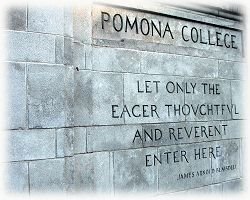
Can you hear Pomp and Circumstance in the background? Sound the trumpets - tomorrow I take my comprehensive exam for my newest master's degree in Music and Human Learning. My first degree, a BA in Sociology, was earned in 1992 from the above-pictured Pomona College. Eager, thoughtful, and reverent? Maybe. May be.
So, in preparation, I decided to pretent to blog instead of study. I hereby present to you, a brief synopsis of ideas from my newest degree (assuming I pass.)
One of my questions for thie four-hour exam will be about including children with disabilities into the general music classroom. Let me tell you - I'm all for it.
In order to include everyone in a comprehensive music education program, or in life in general, there are several quality of life principles that need to be in place.
One of these principles is that of "culturally normative music experiences and participation in socially valued roles" (Jellison, 2000). Huh? Well, listening public (reading public?), this is so important. Imagine your life, surrounded most of the time by people exactly like you, and not being able to socialize or experience life with anyone different from yourself. Your little world is so secluded that you are only exposed to people who are just like you. (This might sound like heaven to a limited few, but to me it sounds miserable.) Not only that, but say you and this group of peers never got to do anything NEAT, and that nobody expected anything of you, because "they" thought you were so different from the rest of the world that you had little to offer. Forget instruments, those aren't for you, you only need to know how to do certain things.
Now imagine one day "they" let you emerge from your little society enclave (learned term that at Pomona), and all you know how to do are the things that your small group has been doing. Now you can't be in a band, because you didn't get to play any instruments. You can't go to a concert because you don't know what kind of music you like. You can't buy a CD because you don't know how to get to the store or look online at amazon.com. You can't discuss music with others over coffee or a beer, because you haven't learned about music. You can't sing the National Anthem at a ballgame or on the 4th of July, because you never learned it.
In 1975 a law called The Education Act for All Handicapped Children was passed, which required students with disabilities to be placed in the "least restrictive environment." This law was changed in 1990 to The Individuals with Disabilities Education Act (IDEA). The law provides funding to public and private schools in order to include children with disabilities in this more inclusive environment. Unfortunately, from what I've seen, schools do not have the resources for this to happen. I see very few children with disabilities in my classroom (student teacher).
This brings me to another quality of life principle of importance in the education of people with disabilities - that of collaboration and support systems. In the school district where I am teaching, we are fortunate to have wonderful paraprofessionals or "aides" to support the children who are mainstreamed into inclusive classrooms. When appropriate, those paraprofessionals (or "paras") are faded out so that the student might come to the classroom without an aide the next semester or year. These professionals provide support for their assigned students as needed. This might be giving deep pressure to a child with some sensory integration issues, or it might be helping that student decide that she needs a break or a time-out. Also, a more natural support for a student with disabilities might be another student without a disability who helps the student get to class (for a visual impairment). A music therpist (that's me!) might also collaborate with the student or his teacher, consulting with either about ways to better incorporate the particular student in the classroom, or to provide some individual or group therapy for the student with disabilities in order to work on some of the skills that will Transfer to the general music classroom.
Participation, self-determination, age-appropriate acitivies, and social interaction are four other principles that can improve the musical lives of children with disabilities.

This guy has the right idea. Suddenly, I don't feel worried about not having 4 hours of stuff to write about. Time to crash. Goodnight, thanks for "listening."

1 comment:
I hope you are having a very Good Friday, and that you aced your exam.
Best wishes for the Easter season to you, your husband, and Punky.
Post a Comment